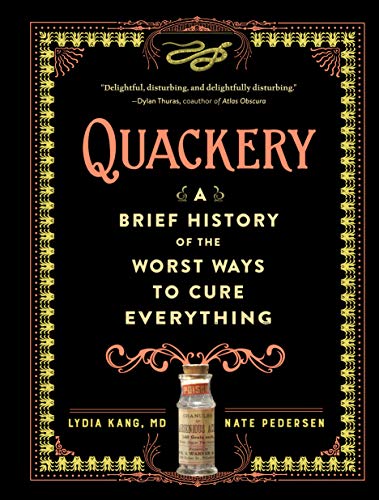Quackery
A Brief History of the Worst Ways to Cure Everything
Lydia Kang; Nate Pedersen
BOOK REVIEW

Step into the bizarre world of Quackery: A Brief History of the Worst Ways to Cure Everything, a diabolical masterpiece by Lydia Kang and Nate Pedersen that delves deep into the outrageous, often ludicrous treatments humans have dared to employ in an attempt to cure ailments through the ages. This book isn't just a read-it's an exhilarating journey through the annals of human folly that invites you to laugh, gasp, and reflect on the bizarre paths we've tread in pursuit of health.
This strikingly engaging work of nonfiction transforms what could be a dry historical examination into a vibrant tapestry woven with derision and intrigue. Kang and Pedersen seamlessly blend humor, thorough research, and a conversational tone that allows you to feel as if you're seated around a table with them, sharing tales of yore filled with leeches, bloodletting, and, horrifically, the infamous "trepanation"-the practice of drilling holes into the skull to release "evil spirits." One cannot help but chuckle while simultaneously cringing at humanity's alarming willingness to embrace the absurd.
As you immerse yourself in Quackery, you're confronted with the shocking realization that the quest for health has taken some of the most outlandish and, at times, barbaric forms imaginable. Picture this: the "cure" for nearly anything ranging from illnesses to baldness included treatments like snake oil and radium-infused water. It's a cringe-worthy gallery of horrors that will leave you questioning how we've come this far-yet fascinated by our relentless and often misguided pursuit of wellness.
What makes this read all the more intoxicating is the authors' ability to weave in stories of real individuals who, seduced by these false promises of cure, put their lives on the line. It's an emotional rollercoaster; you'll vacillate between the trepidation of seeing history repeat itself and the sheer amusement of the outlandish ideas that sprouted during various eras. Consider the audacity of Victorian-era treatments that showcased shocking electrical devices promising miraculous effects or the chilling practice of using mercury as a treatment for syphilis! How is it that we, as a species, navigated such treacherous waters only to emerge with stories worthy of laughter fuelled by disbelief?
Kang and Pedersen don't limit themselves to the past; they elegantly draw parallels to contemporary trends that echo these outlandish practices. Think of the latest health fads and the home remedies that flood our social feeds-are we really any wiser? This introspection ignites a fervent sense of urgency within us, demanding that we question current health practices and perhaps, our susceptibility to the next "miracle cure" that comes along.
Reviews from readers reflect both amusement and disbelief. Many hail Kang and Pedersen for their sharp wit and the book's ability to entertain while educating, yet others contend that the sheer volume of bizarre treatments can be overwhelming. One reader remarked, "It's like a trip through a carnival of horrors and hilarity simultaneously!" Others, however, pointed out that while entertaining, the book risks trivializing real health struggles faced by many. This dichotomy in responses only adds depth to the conversation around the absurdity of quackery, igniting debates on the implications of both the past and present in our health decisions.
As you navigate this thrilling narrative, Kang and Pedersen's clever use of language catapults you into vivid scenes, making you feel every bit of the absurdity that has brushed against our collective quest for healing. Every turn of the page feels like a bite of dark chocolate: rich, decadent, and a little bit sinful. You'll find yourself reflecting on how history's blunders can guide our future-if only we take heed.
In the end, Quackery: A Brief History of the Worst Ways to Cure Everything is more than a historical account. It's a critical commentary on human nature, a laugh-out-loud examination of our gullibility, and a sobering reminder of the importance of skepticism in the face of health trends. This is not merely a book to read; it's a cautionary tale that compels you to consider your own beliefs about health and wellness. So, dear reader, as you close the final chapter, I urge you to carry the lessons learned forward-and share them widely. The world deserves to know the raucous history of quackery and the dangers that may still lurk beneath today's shiny promises. You won't want to miss out on this wild ride! 🚀
📖 Quackery: A Brief History of the Worst Ways to Cure Everything
✍ by Lydia Kang; Nate Pedersen
🧾 352 pages
2017
#quackery #brief #history #worst #ways #cure #everything #lydia #kang #LydiaKang #nate #pedersen #NatePedersen